John Janaro's Blog, page 219
January 28, 2017
The Hope of Saint Thomas Aquinas
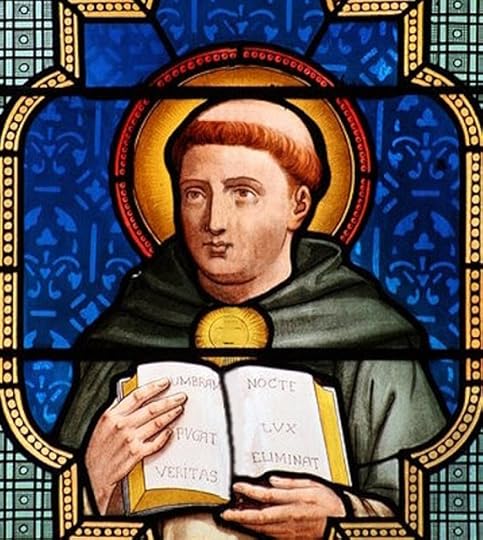
For all the years that I have read and studied the theology of Saint Thomas Aquinas, I have found myself returning again and again to this very simple and yet very rich prayer that is attributed to him. So much of the depth of his theological understanding and contemplative experience is expressed in this humble petition:
"Grant me, O Lord my God,
a mind to know you,
a heart to seek you,
wisdom to find you,
conduct pleasing to you,
faithful perseverance in waiting for you,
and the hope of finally embracing you."
~St Thomas Aquinas
Published on January 28, 2017 15:09
January 23, 2017
Prayer and the "Politics of Mercy"
 Today, the Catholic Church in the United States observes the National Day of Prayer for the Legal Protection of Unborn Children (the ordinary day of observance, January 22, having fallen this year on a Sunday).
Today, the Catholic Church in the United States observes the National Day of Prayer for the Legal Protection of Unborn Children (the ordinary day of observance, January 22, having fallen this year on a Sunday).Catholic Christians in America are called especially to a "day of prayer for the full restoration of the legal guarantee of the right to life and of penance for violations to the dignity of the human person committed through acts of abortion." While we must continually remember and resist all of the cruelty and horrors inflicted in this world, we observe this day with a focus on the violence of abortion, because this violence is directed against the most invisible and defenseless of human persons, and it brings division to one of the most vulnerable and most essential of human relationships: the relationship between mother and child.
This is why Pope Francis, speaking in particular about the dignity of unborn human persons, insists that "a human being is always sacred and inviolable, in any situation and at every stage of development. Human beings are ends in themselves and never a means of resolving other problems. Once this conviction disappears, so do solid and lasting foundations for the defense of human rights, which would always be subject to the passing whims of the powers that be" (Pope Francis).
So we are invited to prayer and penance, today and every day. It is a good reminder for us of the fundamental significance of own interior life, of this hidden, grace-empowered dimension of our humanity.
Prayer and penance are the irreplaceable means that we possess, as sharers in Christ's royal priesthood through baptism, in the struggle against our own sins and the sins of the world. They are the means whereby Jesus's redeeming sacrifice "extends" its human proximity through all space and time, to transform the world. And these means are always available within that immediate and specific piece of the world--of history--that has been entrusted to us.
Through our prayer and sacrifice, God's love draws closer to the anguish and destruction of human violence, to initiate and nurture (often in unseen and unheralded ways) the process of conversion, of the change of hearts, of forgiveness, reconciliation, and healing. Here, then, is the soul of whatever other kind of political or social activism we judge to be prudent and necessary or helpful to build up the common good, to work toward protecting the dignity of every human person and healing the wounds of every kind of violence.
Prayer and sacrifice (which can be a voluntary penance or even the embrace, in faith and love, of the unavoidable sufferings of the present moment) are "activity" that anyone can carry out. They do not replace our specific social and personal responsibilities toward our brothers and sisters in justice and charity. Rather, prayer and sacrifice remain always the vivifying center of the love with which we carry out all our other actions--because we are thus united in our own hearts (which are the origin of our freedom and love) to Christ's crucified love.
We must not allow our actions and our hearts to lose this focus, because the love of Jesus is the only hope for humanity.
Prayer and sacrifice are also a kind of "power" that cannot be taken away from us, no matter how poor and oppressed we are, regardless of sickness, pain, or weakness, in whatever limitations we find ourselves.
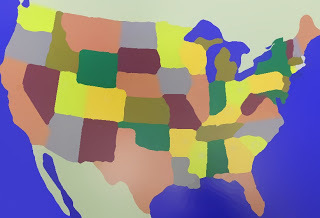 This does not, however, give any excuse to those who hold human power to neglect their responsibilities toward those in need. Not only charity, but also justice and the proper use of political power are the concern of all of us and require our vigilance. We are all responsible for cultivating justice, peace, generosity, and community among the persons and in the places we find ourselves, within our particular circumstances with their demands and possibilities, and as members of a larger society.
This does not, however, give any excuse to those who hold human power to neglect their responsibilities toward those in need. Not only charity, but also justice and the proper use of political power are the concern of all of us and require our vigilance. We are all responsible for cultivating justice, peace, generosity, and community among the persons and in the places we find ourselves, within our particular circumstances with their demands and possibilities, and as members of a larger society.We must always do what we can to love those who have been entrusted to us, and each of us is responsible before God for discerning the concrete ways he calls us to be involved in the various levels of social life. Prayer is not a substitute for the more "external" work of seeking justice and mercy in human affairs, protecting the weak, or building up our families, communities, living environments, peoples, nations, and the international community. But prayer is what carries forward all these good works, and it is also what always remains possible even when no other kind of work is possible.
Prayer is thus the most fundamental political action and also the most "democratic" in that it is always available to everyone, because the Spirit of Jesus is at work in every person's heart. Prayer has the highest aim, in that it directs itself to the One who can do all things, the God of mercy who loves us.
Anyone can pray. Anyone. And if you pray, truly, from the heart, turning to the loving and merciful God who has already redeemed the world, you can be sure that the change you seek has begun--already, in that very moment--in a new way.
For God sees, and God listens, and God works within the mysterious connections that unite us all, one with another. And when you pray, it is because he has already begun to work in you.
It is the beginning of "the revolution of the heart." It is the awakening of the politics of mercy.
Published on January 23, 2017 16:01
January 21, 2017
Saint Agnes Put Jesus First
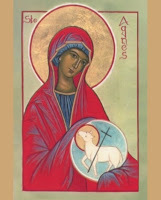 Saint Agnes and the "Lamb of God"Agnes of Rome (c. year 304) was a young woman who put Jesus Christ first in everything, and neither the allurements nor the violence of the powers of this world could take Him away from her.
Saint Agnes and the "Lamb of God"Agnes of Rome (c. year 304) was a young woman who put Jesus Christ first in everything, and neither the allurements nor the violence of the powers of this world could take Him away from her."What I longed for, I now see; what I hoped for, I now possess; in heaven I am espoused to Him whom on earth I loved with all my heart" (antiphon for Saint Agnes, January 21).
Published on January 21, 2017 14:04
January 20, 2017
Becoming King....
 "The order of thought is to begin with ourselves, and with our author and our end.
"The order of thought is to begin with ourselves, and with our author and our end."Now what does the world think about? Never about that, but about dancing, playing the lute, singing, writing verse, tilting at the ring, etc., and fighting, becoming king, without thinking what it means to be a king or to be a man."
~Blaise Pascal, Pensees 146
Published on January 20, 2017 16:04
January 17, 2017
If God is With Us, Why is Life So Full of Darkness?
 I have been reflecting recently on the theme of "epiphany," which indicates that the Mystery--the infinite, inexhaustible fulfillment of meaning, goodness, justice, beauty, and happiness that our hearts are made for and that all reality points toward--that this Mystery beyond our understanding, beyond the reach of all our striving, has become manifest, has appeared in the world.
I have been reflecting recently on the theme of "epiphany," which indicates that the Mystery--the infinite, inexhaustible fulfillment of meaning, goodness, justice, beauty, and happiness that our hearts are made for and that all reality points toward--that this Mystery beyond our understanding, beyond the reach of all our striving, has become manifest, has appeared in the world.He has indeed revealed himself by taking flesh and dwelling among us, by becoming fully human: Jesus of Nazareth. In the coming months we will reflect upon the whole unfolding of God's revelation and communication of himself to us through the life, death, and resurrection of Jesus.
In these events, God, without ceasing to be the Mystery, enters into the depths of human history for the salvation of a world that not only does not fathom him, but that also fears him and rebels against him. God has redeemed the world.
Because of all this, we proclaim that Jesus is Lord. He has all things. He is the meaning of the universe, the meaning of history, the meaning of today, this day, this moment, now.
But that doesn't mean all our problems "go away." The redemption is not magic. It's not a formula for worldly success. It's not a way of escaping the struggles of being human. It's not about protecting us from suffering.
It's about love. God's love, which is the real truth, the real meaning of history, of this moment, this "now."
Jesus's death happens in a moment in time; his resurrection reveals that he has encompassed all of time and embraced the life of every person in his redeeming love. Jesus enters into our "now" and transforms it into an invitation to respond in love to the mystery of his love. His presence empowers our hearts and draws us to respond more and more in love to his love, to abandon ourselves to his love.
 The Source of all things, who sustains all things and "saves them from nothingness," is here. He is with us. His presence and his promise touch our hearts. Yet he remains the Mystery and our lives remain mysterious, full of perplexities, tensions and changes, the foretaste of eternal joy, but also (in what can seem contrary to it) our own insoluble problems, our own pain and suffering.
The Source of all things, who sustains all things and "saves them from nothingness," is here. He is with us. His presence and his promise touch our hearts. Yet he remains the Mystery and our lives remain mysterious, full of perplexities, tensions and changes, the foretaste of eternal joy, but also (in what can seem contrary to it) our own insoluble problems, our own pain and suffering.Human beings live in fear of the mystery of life; they flee from it because it appears to them to be a gaping abyss of darkness. The Christian proposal for our lives does not deny this mysterious abyss, or seek to replace it with some ideology or cheap sentiment. True Christian faith lives the mystery of being human all the way to the abyss and suffers its darkness. Christian faith knows that Jesus is here too, and above all.
Jesus has fathomed the abyss of our own mystery, and calls upon us to trust in him because he encompasses it all in the Mystery itself, in the greater abyss that is Eternal Love. This abyss is an infinite Mercy that will finally take us beyond yearning and longing, beyond ourselves and our limits and into the fulfillment for which we have been made.
He is here and we will be saved if we adhere to him and hold onto him and never let go.
Published on January 17, 2017 20:56
January 16, 2017
Power that is Good
Remembering on this day the Rev. Dr. Martin Luther King, Jr. These simple words have not lost their relevance.
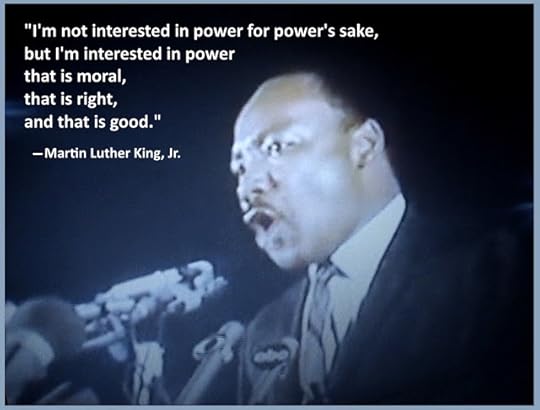

Published on January 16, 2017 12:34
January 15, 2017
Do I Really Believe in Him?
 What does this man Jesus of Nazareth propose to his disciples? And what does he offer to my life, in response to my aspirations, my questions, my struggles with my own limitations, my suffering?
What does this man Jesus of Nazareth propose to his disciples? And what does he offer to my life, in response to my aspirations, my questions, my struggles with my own limitations, my suffering?He offers himself. "I am the way and the truth and the life," he says. "Believe in me, follow me."
Do I really believe in him?
Jesus claims that he is the reason why I exist, that I was created so that I might be his brother, the brother of God the Son--the Word made flesh--and thus come to be, in union with him, a child of the Father in the Spirit. This is why I exist; this is the foundation of my identity and destiny as a created person. God made me because he wanted to love me and to give me the power to love him. I was created so that I might be raised up to share in the life of the Trinity.
And this is true for absolutely every human being without exception. It is at the very core of the humanity we all share. Every person is, by the mystery of God's mercy, on a path of life that leads ultimately to an encounter with Jesus, even though so many know nothing about him right now. This is why our lives and words witness to him, Jesus, always, even as we respect people of other religions, engage in dialogue with them, and learn many beautiful things from their stories of seeking truth and longing for goodness and beauty, from the genuine wisdom embodied in their cultures and traditions, and from the mysterious ways God has drawn them and worked in their lives. As we accompany others, collaborate with them, live in friendship with them, and witness to them, we are servants of the grace of God at work in them and in us.
Jesus wants to share his burning love with others, through us. Jesus wants everyone to meet him and to discover that he is the only answer to the search for meaning and the yearning for love that God has fashioned in the depths of every human heart. Only Jesus really knows me; only he can answer for me the question, “Who am I?”
At this point, I feel that I have to ask myself: Is this something I really believe? Is it the concrete, motivating impetus of my daily life? Do I experience the presence of Jesus and his real love for me? How do any of us answer these questions?
If we are Christians, we want to say "yes" in some way, however fragile, however buried beneath distractions, obscured, forgotten, or mysteriously at work in deep places of our darkness. If we do not know this joy, how will we share it with others?
 We must grow in this awareness, for our own sakes and for others. We must beg the Lord to deepen the conviction and the ardor of our faith and love, so that we will perceive more concretely that the glory of Christ is the real, superabundant, unimaginable answer to every human misery, every human cry of anguish, every authentic human desire for something more than the limits of this world can give.
We must grow in this awareness, for our own sakes and for others. We must beg the Lord to deepen the conviction and the ardor of our faith and love, so that we will perceive more concretely that the glory of Christ is the real, superabundant, unimaginable answer to every human misery, every human cry of anguish, every authentic human desire for something more than the limits of this world can give.We Christians: we need this capacity to see life as it really is. Then we will be able to serve others as witnesses, to give love, to bring healing, to meet human needs with God's mercy.
Going out to the margins, the places of anguish and loneliness, becomes possible and vital as we become more deeply aware of the fact that Jesus himself corresponds to the mystery of the human heart -- my own heart, and the heart of every person I meet. We must beg God to give us the grace to see our world, our circumstances --vividly --in light of this truth.
We must beg God to teach us how to pray, to open our eyes and our hearts to recognize his presence, to be changed by his "humble glory." We must seek him in the life of the Church, drawing strength from the Eucharist and the sacraments, and from one another in the companionship that is born from this new unity we share in his goodness and love.
In this begging, this prayer that adheres to the Lord only to long for him all the more, it becomes clear that every person really is my brother or my sister, that we all stand together in need of his mercy.
Published on January 15, 2017 20:00
January 12, 2017
Christmas All Through the Year
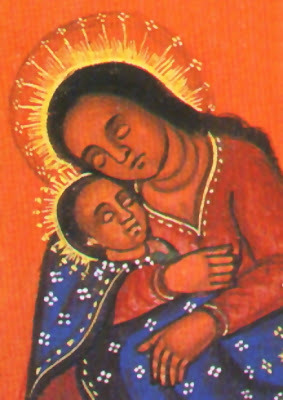 Detail from Ethiopian iconAlthough the great feasts of the Christmas season culminated this past weekend, some of us will keep our lights burning through the rest of the month until February 2. Thus the glow of our Christmas cheer will continue to brighten the often gray wintry days and the long cold nights of January.
Detail from Ethiopian iconAlthough the great feasts of the Christmas season culminated this past weekend, some of us will keep our lights burning through the rest of the month until February 2. Thus the glow of our Christmas cheer will continue to brighten the often gray wintry days and the long cold nights of January.Ultimately, however, "Christmas" indicates a fact that shapes all of our days and all of our years: God has come into the world.
From Bethlehem to the Jordan, we have celebrated in these recent weeks God's "opening up of himself," his giving of himself to us. He who is the Mystery that every human person seeks, who is on "the other side" of the More that every person pleads for in front of reality: he has done something beyond all of our dreams and our myths and our philosophy and our striving. He himself--the Infinite Mystery--has come into our reality, into actual human flesh and blood.
God is with us. He had made his dwelling among us and remains with us. He has intervened directly and totally in the story of the human race. God himself dwells among us, in the midst of our human weakness, our self-indulgence, our cruelty, barbarism, blindness, idolatry, and willful ignorance of his compassion and love.
God has given everything; he has poured himself out in love, and in so doing he manifests his ineffable glory, for God is Love. The fullness of the revelation of God is in this love that overcomes sin, that embraces us and saves us, redeems us and heals us. The Infinite Mystery is Infinite Mercy.
And Divine mercy has a human face and a name: Jesus.
Published on January 12, 2017 18:43
January 10, 2017
"My Faith is My Whole Life"
Seven Months.
"My faith is huge to me. It's not like, 'Oh it's just a section of my life.' No, my faith is my whole life" (Christina Grimmie).

"My faith is huge to me. It's not like, 'Oh it's just a section of my life.' No, my faith is my whole life" (Christina Grimmie).

Published on January 10, 2017 19:55
January 9, 2017
Looking For the Meaning of Life? Listen to Him.
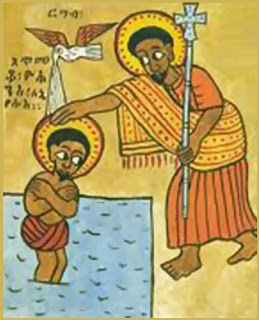 Baptism of Jesus, detail from Ethiopian icon."A voice came from the heavens, saying, 'This is my beloved Son, with whom I am well pleased'" (Matthew 3:17). And then again, at the Transfiguration: "From the cloud came a voice that said, 'This is my beloved Son, with whom I am well pleased; listen to him'" (Matthew 17:5).
Baptism of Jesus, detail from Ethiopian icon."A voice came from the heavens, saying, 'This is my beloved Son, with whom I am well pleased'" (Matthew 3:17). And then again, at the Transfiguration: "From the cloud came a voice that said, 'This is my beloved Son, with whom I am well pleased; listen to him'" (Matthew 17:5).“Listen to him.”
Is it not a wonderful thing that there is Someone to whom we can listen?
It means that our lives are not meaningless chaos. All the uncontrollable circumstances, the violence, the disappointments of our lives are understood and taken up by Someone who turns everything to the good, who draws the whole of this crazy life towards a purpose, a fulfillment in wisdom and love.
And if we listen to Him we can enter into that purpose and discover therein redemption and mercy.
Published on January 09, 2017 18:19



